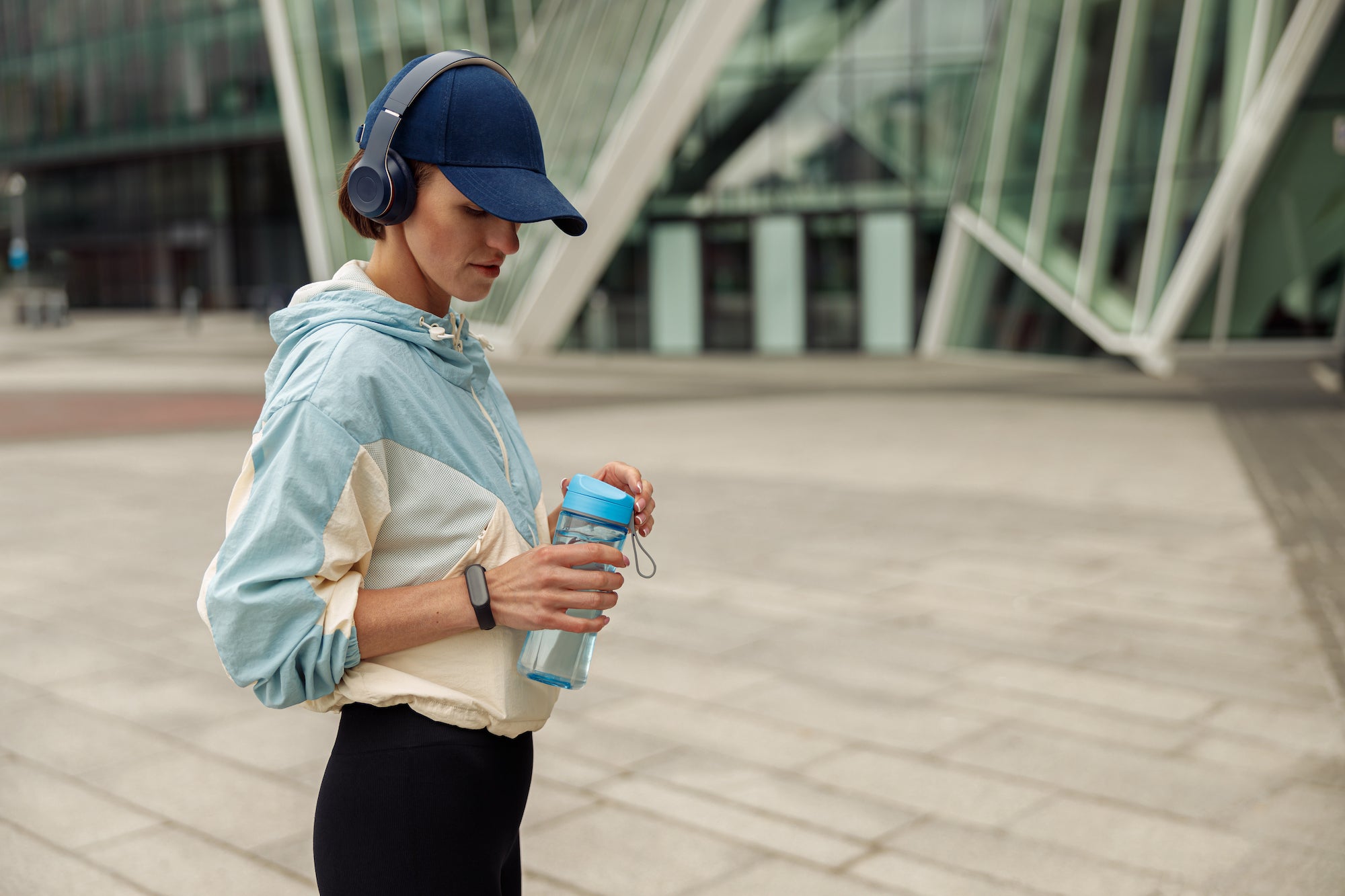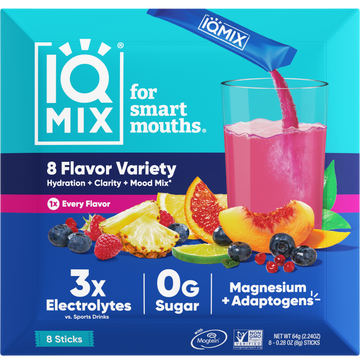Does sweat release toxins, or are we just trying to make sweat seem less gross?
People spend hours in hot yoga classes and pricey infrared saunas hoping to sweat out toxins and environmental pollutants.
But what exactly are these mysterious substances we need to help our body eliminate? And how does the detox process work (if it even does)?
We’re breaking a mental sweat to uncover the science behind perspiration today. To get to the bottom of this persistent wellness myth, we must first understand:
What is Sweat Anyway?
Sweat is a natural fluid released by sweat glands in your skin. Sweat is 99% water and 1% NaCl (sodium chloride, i.e., salt) and fat.[*]
However, this complex mix of chemicals may also contain tiny concentrations of minerals, electrolytes, and waste products like:[*]
Where Does Sweat Come From?
We have three types of sweat glands in our skin:[*]
- Eccrine sweat glands. The most common, we have roughly two to four million of these around our body. They concentrate in the skin of your palms, armpits, and soles of your feet. Eccrine glands produce a clear, watery, odorless type of sweat.
- Apocrine sweat glands. These open into hair follicles instead of on your skin’s surface like eccrine glands. They exist on your face, head, chest, armpits, groin area, and other locales.
Kicking in around puberty, these glands produce a thicker, milky fluid that contains proteins and lipids. When this sweat comes into contact with bacteria on the skin's surface, we get the distinct aroma known as body odor.
- Apoeccrine sweat glands. The most recent to hit the scene (they were only discovered in 1987), apoeccrine sweat glands share properties with their eccrine and apocrine brothers. Their function and secretions aren’t fully understood yet.
So what is the purpose of sweat?
Why Do People Sweat?
Sweat is our body’s natural response to triggers like heat and humidity, exercise, physical activity, fever, stress, anxiety, and other health conditions.
Hyperhidrosis (excessive sweating) can be caused by issues like low blood sugar levels and thyroid disorders. Anhidrosis (sweating too little) may be a sign of dehydration, skin disorders, or nervous system conditions.
Sweating helps our body:
Regulate Body Temperature
Sweat’s primary purpose is thermoregulation.[*]
When we become too hot, our sweat glands get the green light to release sweat through our skin’s pores. It then spreads across our skin’s surface. As the sweat evaporates, it dissipates heat to cool down our body and keep our core temperature within normal range.
This savvy temperature control system prevents overheating when we’re too hot to handle.
Protect Our Skin Health
Take a look at your favorite moisturizer, and you might find a few of the same ingredients your sweat contains. Eccrine sweat specifically helps maintain our skin barrier’s homeostasis by:[*]
On the other hand, if you’re sweating in a humid environment, you may snag more microorganisms on your skin than you’re comfortable with. Humidity prevents sweat evaporation, which means your sweat may mix with skin bacteria that cause infections. Don’t let your skin stay swampy; towel off or hit the showers.
So now that we know why we perspire, let’s ask science to answer this question:
Does Sweating Detox Your Body?
Contrary to the wellness myth you’ve probably heard for years, sweating does not purge your body of toxins.
Let’s break this down:
Sweat is 99% water and just 1% electrolytes, waste material, and other compounds.
This means the concentration of potential toxin excretion via sweat would be incredibly low. It’s nearly impossible to measure in studies, and eliminating it wouldn’t significantly improve our health.
As one doctor and chemistry professor told The New York Times, believing sweat will help you detox toxins is like removing a dropper-full of bathtub water to reduce the risk of drowning.[*] It’s “effectively meaningless.”
So where did this detoxifying myth come from?
The Truth Behind the Bad Science
In a few early studies, researchers found toxins like heavy metals, pollutants, phthalates, and bisphenol A (BPA) in sweat samples.[*]
But when their peers reviewed these experiments, they noticed some very flawed collection methods to test these sweat batches. They said these methods artificially increased the concentration of toxins in the samples, rendering them useless in the evidence department.[*]
To prove this point, scientists in one study used sweat-collecting skin patches to analyze subjects’ sweat and urine for seven days, replacing the sketchy collection methods from earlier experiments. Unsurprisingly, these researchers found BPA in urine but not in sweat.[*]
Other studies have confirmed these findings.[*]
The truth is, there’s no medical mechanism to explain how our sweat glands could release toxins the way our renal system does.
So How Does the Body Get Rid of Toxins?
Our renal system (or urinary system) is responsible for clearing excess micronutrients, metabolic waste, and toxicants from our bloodstream and eliminating them from our body.[*]
Our liver, gastrointestinal tract (GI), and kidneys do a far better job filtering and breaking down waste products than our sweat glands could ever hope to achieve.[*][*]
Studies show up to 97% of BPA gets eliminated via urine five to seven hours after exposure — and 100% is eliminated after 24 hours.[*] Our fecal output is the express train for heavy metals to get out of town.[*]
We have all the detoxifying abilities our body needs, they’re just not in our sweat glands.
So If You’re Going To Sweat, Sweat Smarter
Even though you can cross detoxification off your list of reasons to hit a hot yoga class, the health benefits of sweat-inducing activities still make them worth doing.
Exercise for your brain health and physical wellness is always a good idea — especially when the heat makes you work harder. Saunas may relax your stress away, which we could all benefit from.
The bigger issue you need to consider when it comes to sweat is electrolyte imbalance.
Besides water, scientists say electrolytes are lost in the highest concentrations when we sweat.[*] Failing to replenish your lost electrolytes could lead to electrolyte deficiencies, which carry side effects like:
- Muscle twitches
- Muscle cramps
- Fatigue and weakness
- Dizziness
- Irregular heartbeat
- Confusion and irritability
That’s why optimal hydration is more than just chugging plain ol’ water.
Sure, it may prevent dehydration after a sweat sesh. But drink too much H2O without replacing your electrolytes, and you’ll suffer the effects of overhydration. You’ll dilute your concentration of electrolytes so they’re too weak to perform.
🌟 Psst! Learn the golden rule for how much water you should drink each day.
Clean, Sugar-Free Electrolyte Drinks For The Win
To prevent dehydration and electrolyte imbalances when sweating, skip the sugary sports drinks and grab the best hydration powder for your goals.
IQMIX is the ultimate vegan, sugar-free, keto hydration mix. Each packet contains:
- 750mg of Magtein® (Mg L-Threonate). This clinically studied form of magnesium boosts cognition and mood.
- 500mg of Sodium. As the most important electrolyte, sodium is critical for optimizing fluid levels.
- 450mg of Potassium. This key electrolyte supports muscle function and blood pressure.
- 250mg of Lion’s Mane. A super-concentrated form of Lion’s Mane, this nootropic and adaptogen supports your brain health, lowers stress, improves mental performance, and more.
Hydration mixes take the sweat out of tracking your dietary electrolyte sources and ensure that the best drink for dehydration is always on-the-go like you are. Just stash one in your gym bag, add it to your water bottle, and power on.
So Does Sweat Release Toxins? Cool Facts vs. Detox Fiction
Sweating is not a magic detoxifying spell. It’s an efficient system to keep our bodies cool when they may otherwise overheat or go into meltdown status. And it’s far more graceful than panting like our four-legged friends when they’re hot.
So if you feel fantastic when sweaty, it’s probably because you’re getting your heart rate up, boosting blood flow, or soaking up vitamin D from the sun. Just do all those activities with a jug of electrolyte-infused water by your side.
🍹 Water or flavor party? Try the IQMIX Tropical Pack for sunny Piña Colada and Passion Fruit vibes. Or stick with the IQMIX Classic Sampler to taste test our Lemon Lime, Blood Orange, Blueberry Pomegranate, and Peach Mango flavors. Find your fave now!
Written by Lauren Ciccarelli, a writer and research geek passionate about low-carb nutrition, mental health, and meditation. Her 2,500+ articles empower doers with science-backed tips for leveled-up living.




